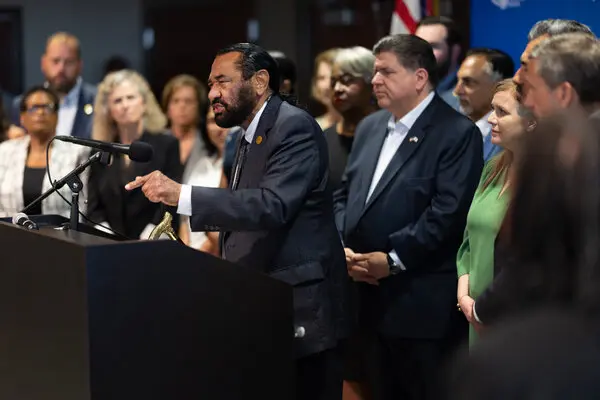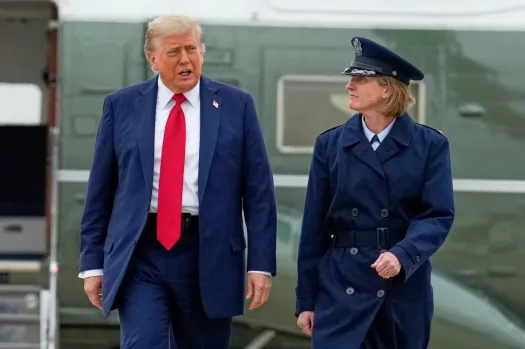Former President Donald Trump’s influence within the Republican Party has remained a topic of intense discussion, particularly as new political battles unfold in Congress. Following his endorsement of Florida Congressman Matt Gaetz for key leadership roles, the stakes have only increased, as other controversial nominees and positions test Trump’s sway over Senate Republicans. The situation presents a unique challenge, both for Trump’s political future and for Republican unity in the Senate. As senators face key votes on Trump-backed candidates, the outcome of these decisions could significantly affect the party’s direction and its ongoing relationship with its former leader.
The Gaetz Controversy: A Test for Trump’s Influence
Rep. Matt Gaetz, who has long been a polarizing figure within the GOP, offers the first glimpse of how Trump’s influence may impact Senate Republicans in the years following his presidency. Gaetz, known for his outspoken rhetoric, support for Trump’s policies, and controversial legal issues, has been a staunch defender of Trump’s legacy. His position in Congress has been further complicated by ongoing investigations and allegations related to sex trafficking, which have made him a lightning rod for critics within both the Democratic and Republican parties.
Trump’s endorsement of Gaetz, however, reflects a broader strategy of supporting loyalists and making political capital from his relationships with members of Congress. Many of Trump’s supporters believe that his sway is as strong as ever, particularly in Republican primaries and among the party’s conservative base. However, his backing of controversial candidates like Gaetz may be testing the limits of that influence within the Senate, where members are more attuned to the concerns of a broader electorate, particularly in swing states.
Gaetz’s case is important because it highlights a growing divide within the GOP. While Trump’s influence remains potent in the House of Representatives and among hardline conservatives, Senate Republicans must balance their allegiance to Trump with the need to represent a more moderate constituency, especially in battleground states. Senate Republicans are well aware that embracing or rejecting Trump’s endorsement can impact their re-election chances, making them increasingly cautious in their support for controversial figures.
Other Controversial Nominees Testing Trump’s Influence
The situation with Gaetz is far from isolated. In recent months, other controversial nominees backed by Trump have tested Senate Republicans’ loyalty and political calculations. These nominees often come with baggage, whether it’s their association with Trump’s post-election legal challenges or more personal controversies that may alienate moderate voters. Trump’s endorsement of these figures adds additional pressure on Republican senators, particularly as they seek to maintain control of the Senate and position themselves for success in the 2024 elections.
Several high-profile figures, including those who have been linked to far-right movements or hold controversial views on issues like immigration, race, and climate change, have been placed on Trump’s list of preferred candidates for federal positions. While Trump’s ability to rally his base around such figures has not waned, the challenge remains for Senate Republicans who must publicly weigh in on these nominees.
For Senate Republicans, the question is not just whether they support Trump’s nominees but also how their votes will be perceived by both the public and their colleagues. Votes in favor of controversial figures can open senators to attacks from Democratic opponents and moderates within their own party. For example, a nominee with extremist views could alienate suburban voters, who have increasingly shifted toward the Democratic Party in recent years. At the same time, rejecting Trump-backed candidates could invite backlash from the more conservative factions of the GOP and potentially risk Trump’s ire or the loss of the party’s base.
Divisions Within the Senate GOP: A Battle for the Future of the Party
As Trump continues to hold significant sway over the Republican base, his influence on the Senate GOP has sparked a growing divide between the party’s conservative and moderate factions. While the far-right wing of the party is often quick to back Trump’s nominees, more centrist Republicans are increasingly wary of alienating independent and swing voters—groups that have been key to the GOP’s past successes in competitive states.
This rift became particularly evident after the 2020 election, when Trump’s claims of election fraud and the storming of the Capitol led to deep divisions within the GOP. Some Senate Republicans, such as Mitch McConnell and other senior figures, have sought to distance themselves from Trump’s rhetoric while still maintaining support for his policies. These moderates have often found themselves at odds with Trump’s more hardline supporters, particularly when it comes to nominations and appointments.
As the Senate looks toward the 2024 elections, this divide will only deepen. Senate Republicans face the delicate task of balancing their ties to Trump with the need to appeal to a broad electorate. For some, the question is whether Trump will remain an asset to their re-election campaigns or if his polarizing effect will ultimately hurt their chances. The outcome of these internal battles will have lasting consequences for the direction of the Republican Party and its ability to effectively govern.
Trump’s Endorsements and the Impact on Senate Races
While Trump’s endorsements can serve as a powerful tool for influencing Republican candidates, they also create a distinct challenge for those seeking to maintain a more moderate or independent stance. Senate races in battleground states, such as Arizona, Georgia, and Pennsylvania, have already shown how Trump’s involvement can impact electoral outcomes. Candidates who align too closely with Trump risk alienating key voter groups, while those who distance themselves from him may fail to energize the GOP base.
In some cases, Senate Republicans have sought to temper Trump’s influence by making strategic decisions on nominations or other political appointments. For instance, some senators have expressed concerns about supporting individuals whose views might be considered too extreme or divisive. In these cases, they may choose to reject Trump-backed nominees in favor of individuals who can appeal to a wider audience, both within the party and among general election voters.
Yet, there is no denying that Trump’s continued popularity within the party gives him a substantial advantage in shaping the GOP’s future. His influence is especially evident in the nomination process, where his endorsement carries significant weight with conservative voters. As more controversial nominees come to the forefront, the Republican Party will be forced to grapple with whether to embrace Trump’s influence fully or try to strike a balance that appeals to a broader coalition.
The Road Ahead: Trump’s Continuing Influence and the Future of Senate Republicans
As more Trump-backed, controversial nominees come under scrutiny in the Senate, Republicans will face crucial decisions about the direction of their party. The tension between Trump’s loyal base and the party’s moderates is likely to escalate as the 2024 election approaches. Senators will need to weigh the political consequences of their decisions, with the knowledge that their support for or rejection of Trump-backed candidates could have far-reaching consequences.
For now, Trump’s sway with Senate Republicans remains a key factor in shaping the party’s future. While some senators may look to distance themselves from his more divisive nominees, others may see him as an essential ally in maintaining the loyalty of the GOP’s conservative base. The struggle to balance these competing forces will define the future of the Republican Party, and its relationship with Donald Trump, in the years to come.
Ultimately, the outcome of this battle will determine whether Trump’s legacy can continue to influence the GOP or if the party will chart a new course as it seeks to regain broader public support. The continued fight over Trump’s endorsements and controversial nominees is a microcosm of the larger ideological struggle within the Republican Party, one that will have lasting implications for the political landscape in the United States.



